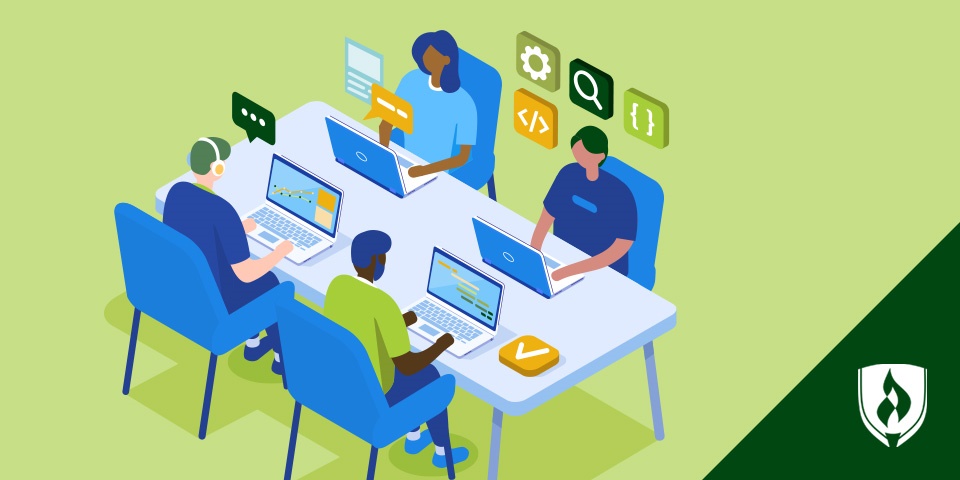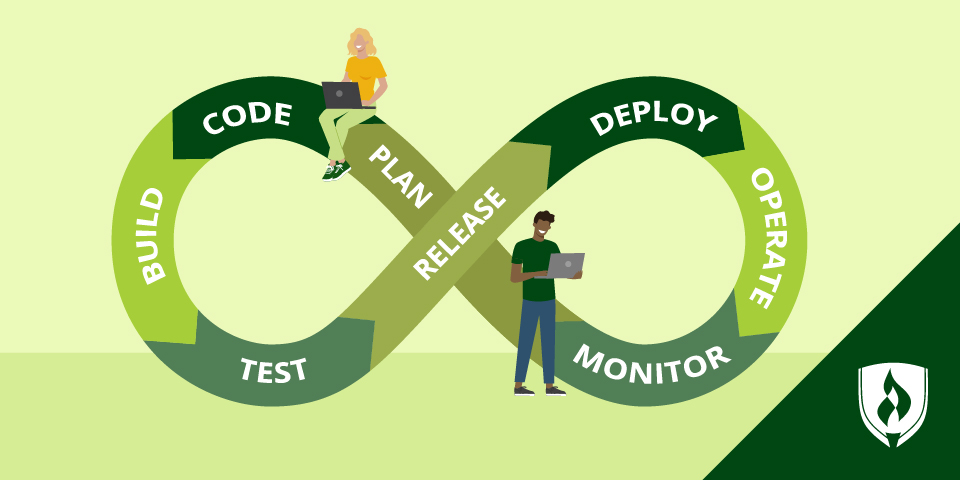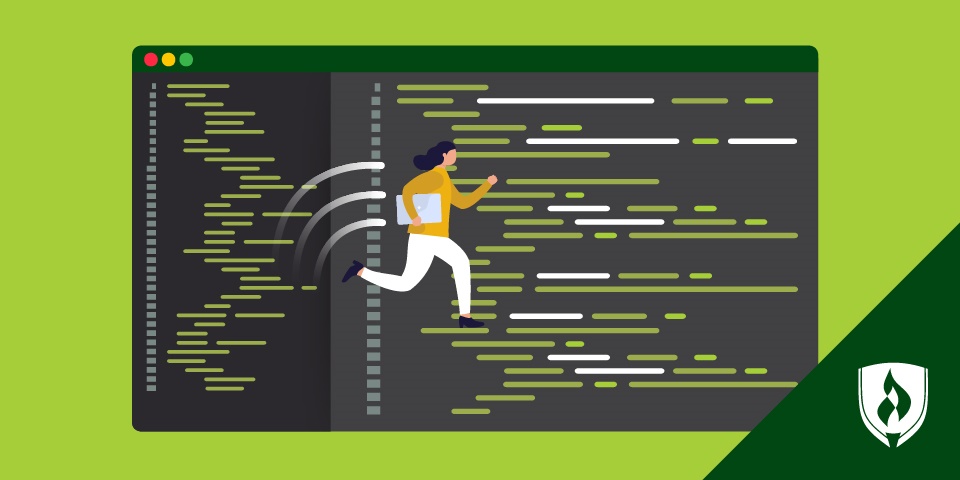
You’ve always had a penchant for solving puzzles and problems—especially when it comes to technology. Not only that, but friends and family frequently come to you for help with all their tech troubles. And you’re typically the first one in line when a new gadget is released. You simply love the innovative world of technology and the possibilities that come with it.
If this sounds like you, you have a lot of the characteristics of a person who would make a great software developer. You’re intrigued by the opportunity of working in software development, but you’re probably wondering: What does a software developer do, anyway?
We compiled the data and insights you need to answer this question and others about what to expect with a job in software development. Keep reading for everything you need to know as you consider this important tech career.
What is a software developer, exactly?
You know that smartphone app you rely on? That computer game that kept you transfixed for hours as a kid? That program that helps you budget and track expenditures? Software developers created all of them.
Software developers are the creative, brainstorming masterminds behind computer programs of all sorts. While some software developers design these computer applications and programs, others focus on identifying problems with them and reporting defects.
This differentiation covers two popular pathways: software developers and software quality assurance analysts and testers. While both careers help bring applications and systems to their fully functional potential, this page will focus on software developers specifically.
What do software developers do?
A software developer creates computer applications that allow users to do specific tasks, as well as creates the underlying systems that run devices or control networks, according to a description by the U.S. Bureau of Labor Statistics (BLS).1
What are some common software developer job duties?
A software developer is involved in the end-to-end process of creating a software program. Depending on the company where they work, a software developer will analyze the needs of the user and then create, test and develop software that will solve a problem, provide entertainment or simply make life easier for its intended audience.
A software developer designs each piece of an application or system, and then plans how the pieces will work together. After mapping out the design, creating flowcharts and drafting out each step of the process, the developer builds diagrams and models to instruct programmers on how to write the program code. While some software developers write the code themselves instead of handing it off to a programmer, it's not a standard job requirement.
Other job duties of a software developer include mapping out the software to keep on record for future upgrades and enhancements, as well as testing the software and collaborating with other computer specialists to make sure the software is top notch and functioning properly. In addition to developing new software programs, a software developer may also recommend upgrades for their customers’ existing software programs and systems.1
What are examples of different types of software developers?
This field is so large that it can help to narrow down the type of software you are most curious about. Here are some options to consider.
Applications software developers
An applications software developer designs computer applications for consumers. This can include anything from the weather app to your favorite phone game, and a ton in between. When we think of applications software development we tend to picture commercial software that's sold to the general public, but applications software developers can also create custom software for a specific customer—whether that's a small business owner or a private company.
Some applications software developers also create databases for personal or online use.1
Software engineers
Software engineers take a bird-eye view of a project’s system and software requirements, and then plan its scope and order of work. Software engineers work closely with—and can direct the work of—both software developers and software quality assurance analysts and testers.1
Systems software developers
A systems software developer creates operating systems either for the public or for a specific organization. The operating systems that systems software developers create keep computers functioning and control most of the consumer electronics used by people in today's world—including cars and mobile devices.
Systems software developers may also build the interfaces that users interact with while operating these various devices.1
What are some important software developer skills?
Any software developer must have a healthy balance of hard and soft skills. Not only are software developers in charge of outlining and creating the code and design for a program, but the career generally involves a lot of collaboration between various stakeholders.
Top technical skills for software developers
In such a complex role, a software developer needs to have some precise technical know-how. We used real-time job analysis software to examine more than 1 million software developer jobs posted over the past year.2
This data revealed the top technical skills and programming languages that employers are looking for in the software development space:
- Java®
- SQL
- Software engineering
- JavaScript®
- Python®
- Microsoft® C#
- Linux
- Git
- Oracle
- DevOps
Top transferable skills for software developers
Mastering the skills above is only half the equation of becoming a successful software developer. The best software developers also have certain transferable skills to complement their technical knowledge.
1. Problem-solving ability
The whole point of developing software is to create programs that solve the user's problem. If you’re the type who tends to identify issues and figure out the best way to approach a solution, you may be a perfect fit for a software development career. Not only that, but programming is often an exercise in problem-solving and troubleshooting—patiently and strategically debugging code is a big part of the work.
2. Teamwork
Contrary to common stereotypes, every software developer isn't secluded at their desk with no contact with the outside world.
In reality, most software developers spend a lot of time teaming up with other developers and programmers to create a prime product for the user. Great communication, empathy and a knack for productive collaboration are a must if you want to become a software developer.
3. Analytical and strategic
Software development can be a lot like trying to solve a new mystery every day. If you’re someone who likes looking at the big picture as well as analyzing smaller steps along the way, you’ll be right at home developing software.
There’s a lot of strategic planning that goes into creating software programs, and a ton of figuring out the fastest or most efficient path from point A to point B. If you're naturally adept at this, you'll have a big advantage.
4. Intrinsic motivation
Creating software can be tricky, tedious work, so it’s important that you don’t get bogged down or discouraged when you don’t succeed the first time you try something. If you’re the type of person who is naturally determined to finish everything you start, you may be well-suited for a career in software development.
Where do software developers work?
Software developers held about 1.5 million jobs in 2022, according to the BLS. These jobs are spread across dozens of fields and industries, and the number of settings where software developers work continues to grow as technology advances and becomes more prevalent in day-to-day life.
There are tons of options when it comes to the industry and work environment you're interested in, as well as the type of work you could end up doing as a software developer.
While many developers work full-time in a traditional office environment, many also work remotely, on a contract basis, or in an agency setting. This variety allows you to tailor your career to fit your personal preferences, starting with the field you choose to focus on.
These are the top 5 industries with the highest employment levels of software developers, as of May 2022:
Top industries for application software developers
- Computer systems design and related services
- Software publishers
- Management of companies and enterprises
- Computing infrastructure providers, data processing, web hosting and related services
- Credit intermediation and related activities
Top U.S. states for software developers
To answer the question of where software developers work more literally, we looked at a breakdown of software developer employment by states. These are the top five states with the highest employment levels of software developers, as of May 2022:1
Along similar lines, these are the top five states with the highest concentration of jobs and location quotients in software development as of May 2022:1
What is the software developer career outlook?
Overall employment of software developers is projected to grow 25 percent from 2021 to 2031, which is much faster than the average for all occupations, according to the BLS.1 An average of 162,900 job openings for software developers are projected each year over that same decade, and many of those openings are expected to result from the need to replace workers who transfer to different occupations or exit the labor force to retire.
This growing demand goes hand in hand with the increased need for software development in areas like artificial intelligence (AI), Internet of Things (IoT), robotics and automation. It's also a response to increased cybersecurity concerns and threats, as organizations expand their investments in software that protects their data systems, networks and infrastructure.
It may seem obvious, but a large part of the strong job outlook for software developers over the next decade stems from the growing prevalence of software itself. For example, software systems continue to be built for consumer electronics and other products that we've never considered "smart devices" before, including IoT-connected devices and electric vehicles.1
It's simple: the more products that use software, the more software developers we'll need—and all signs say that's the direction we're headed right now.
Ready to start your career in software development?
The future is bright for software developers of all kinds—and that includes anyone considering the career path. Now that you’ve had a closer look at the ins and outs of this critical role, you can better discern if you’re programmed to work in software development.
If you’re ready to start developing your career in software development, start planning your next steps by reading our article, “How to Become a Software Developer: Experts Expose Their Best Advice.”
Related Articles:
- The E-Commerce Developer Job Description, According to Actual Developers
- What Does IT Do? A Look at the Most Dependable Department in the Office
1Bureau of Labor Statistics, U.S. Department of Labor, Occupational Outlook Handbook, [accessed July 2023]. Salary ranges represent national, averaged earnings for the occupations listed and include workers at all levels of education and experience. Ranges do not represent starting salaries and employment conditions in your area may vary.
2Burning-Glass.com analysis of 1,223,537 software developer jobs, Mar. 01, 2019 – Feb. 29, 2020).
Java, JavaScript and Oracle are registered trademarks of Oracle Systems, Inc.
Python is a registered trademark of The Python Software Foundation, Inc.
Microsoft C# is a registered trademark of Microsoft, Inc.
EDITOR’S NOTE: This article was originally published in November 2016. It has since been updated to include information relevant to 2023.




